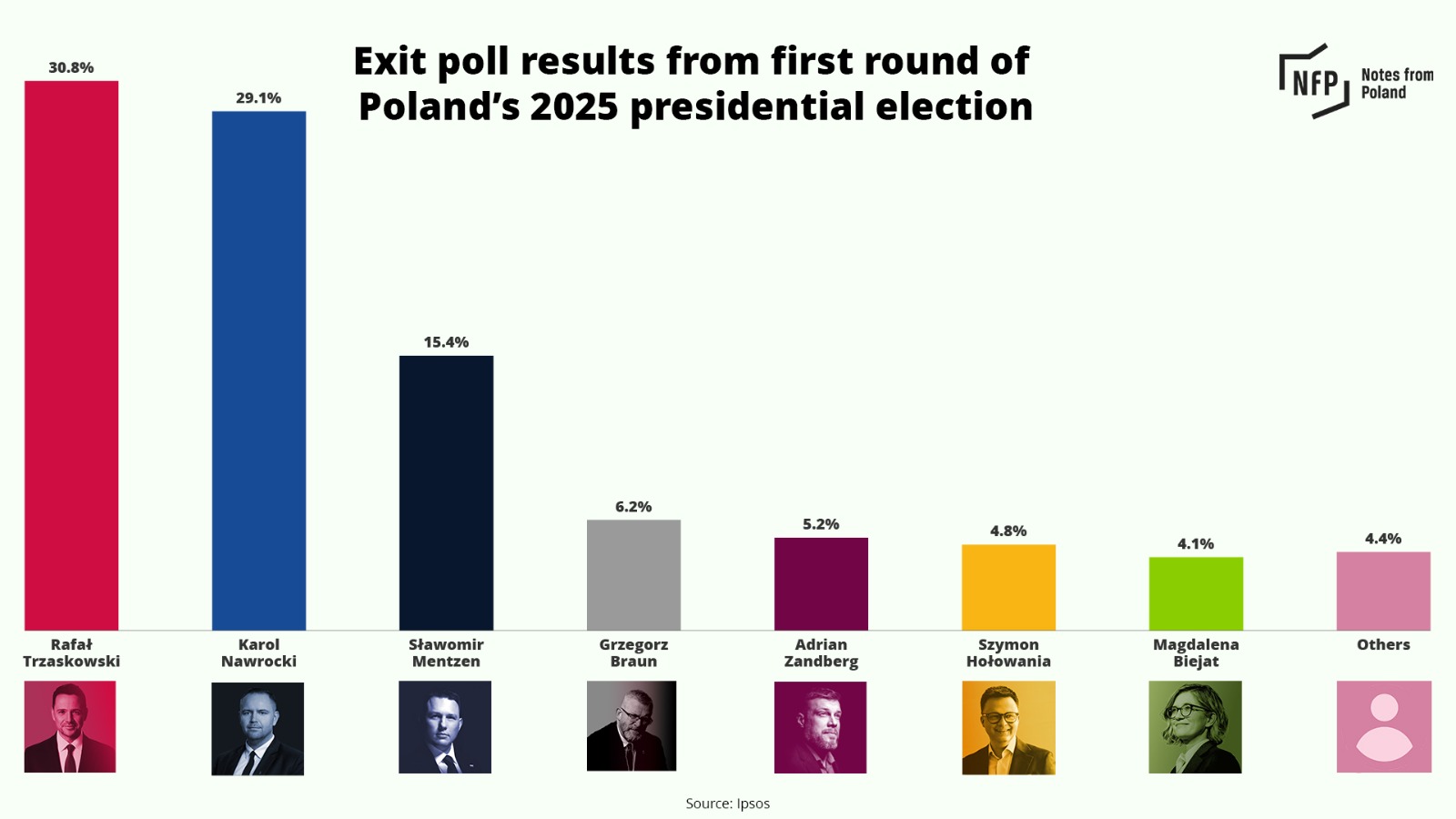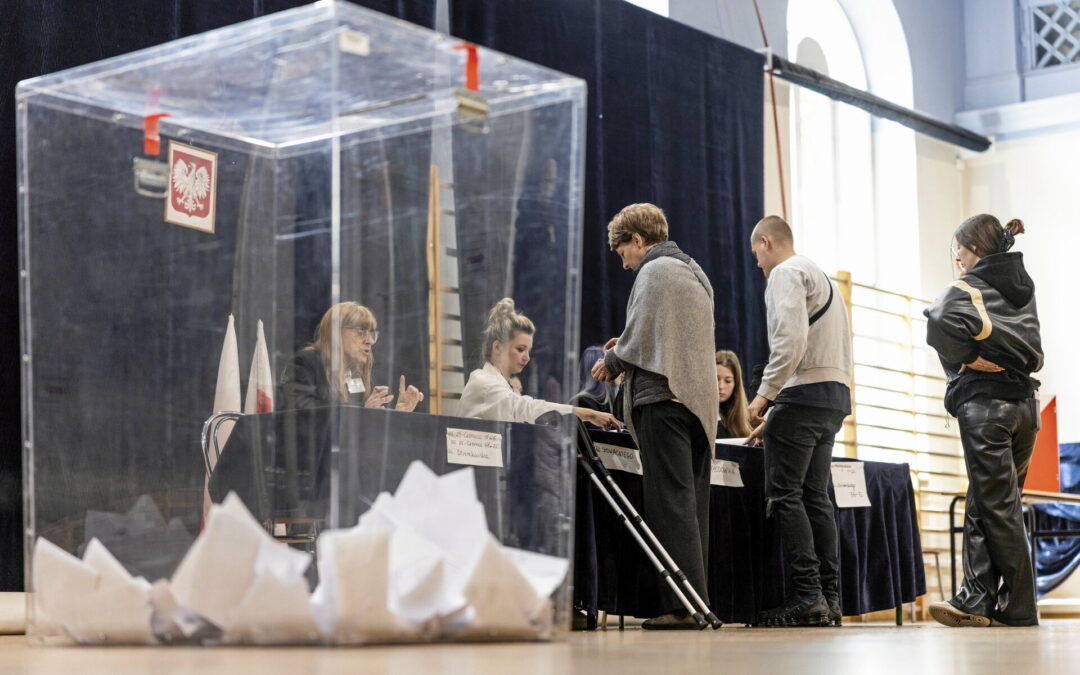Keep our news free from ads and paywalls by making a donation to support our work!

Notes from Poland is run by a small editorial team and is published by an independent, non-profit foundation that is funded through donations from our readers. We cannot do what we do without your support.
This is a breaking news story and may be updated as events progress
The exit poll from today’s presidential election in Poland indicates that first and second position – and therefore a place in the decisive run-off in two weeks’ time – have been taken by the centrist government-aligned candidate Rafał Trzaskowski and the conservative opposition-backed Karol Nawrocki.
However, their respective figures – 30.8% for Trzaskowski and 29.1% for Nawrocki – are so close that only once official results emerge will it be certain who has finished first. In previous elections, exit polls have closely matched the final count, but they have a margin of error.

Today’s exit poll, conducted by Ipsos at 500 randomly selected polling stations around Poland, also shows a strong result for the two main far-right candidates, Sławomir Mentzen, who is third on 15.4%, and Grzegorz Braun, who is fourth on 6.2%.
They were followed by the two main left-wing candidates, Adrian Zandberg (5.2%) in fifth and Magdalena Biejat (4.1%) in seventh, who have centrist Szymon Hołownia (4.8%) in between them. The remaining six candidates have 4.4% in total.
Earlier on Sunday, while voting was already underway, the head of the National Electoral Commission (PKW), Sylwester Marciniak, said that he believed the final, official result will be announced late on Monday.
In Polish presidential elections, if no candidate wins more than 50% in the first round, the two candidates with the most votes meet in a second-round run-off two weeks later. Trzaskowski and Nawrocki will now battle it out for the support of those who voted for other candidates, while also seeking to shore up their own bases.
Whoever emerges triumphant on 1 June will succeed incumbent President Andrzej Duda, whose second and final five-year term in office ends in August.
The outcome will be extremely significant for how Poland is ruled over the coming years. The president has little role in day-to-day governance but can veto bills passed by parliament, a power Duda, who is aligned with the opposition, has used to stymie the agenda of the current government.
Our essential guide to next month's presidential election in Poland, covering:
▶️How it works (and if and how you can vote)
▶️Who is standing (and who is most likely to win)
▶️What the campaign has looked like so far
▶️Why the election matters https://t.co/s59QlRsy61— Notes from Poland 🇵🇱 (@notesfrompoland) April 23, 2025
The ruling coalition – which ranges from left to centre right – will be hoping that Trzaskowski, deputy leader of the centrist Civic Platform (PO), the main ruling party, can claim the presidency.
The national-conservative Law and Justice (PiS), the main opposition, will pin their hopes on Nawrocki, the candidate they are supporting, continuing Duda’s role in acting as a brake on the government’s plans.
Meanwhile, the far-right may act as a kingmaker in the second round, with Mentzen and Braun having over 21% of the vote between them, according to the exit poll.
Hołownia and Biejat represent two parties that are part of the government, the centrist Poland 2050 (Polska 2050) and The Left (Lewica). Zandberg’s Together (Razem) party was previously aligned with The Left but last year broke away from it and the ruling coalition.
Far-right candidate @SlawomirMentzen's rise in the polls has turned Poland's presidential election into a three-horse race
Mentzen has managed to detoxify his party and has benefited from other candidates mainstreaming its positions, writes @danieltilles1 https://t.co/Ql9LihJ7tu
— Notes from Poland 🇵🇱 (@notesfrompoland) February 28, 2025
Today’s vote came after months of campaigning that has seen the interlinked questions of security and migration dominate the debate. All of the leading candidates sought to talk tough on those issues. The final two weeks of the campaign also saw attention drawn to scandals linked to the two leading candidates.
Nawrocki falsely claimed in a televised debate to own only one apartment. It quickly emerged that he not only owned a second, but that there were many questions over how he had come to possess it and how he had treated the elderly, disabled man living there.
Meanwhile, earlier this week the authorities took action over a series of suspected foreign-funded Facebook adverts that expressed support for Trzaskowski and criticism of Nawrocki and Mentzen.

Notes from Poland is run by a small editorial team and published by an independent, non-profit foundation that is funded through donations from our readers. We cannot do what we do without your support.
Main image credit: Jakub Wlodek / Agencja Wyborcza.pl

Daniel Tilles is editor-in-chief of Notes from Poland. He has written on Polish affairs for a wide range of publications, including Foreign Policy, POLITICO Europe, EUobserver and Dziennik Gazeta Prawna.



















